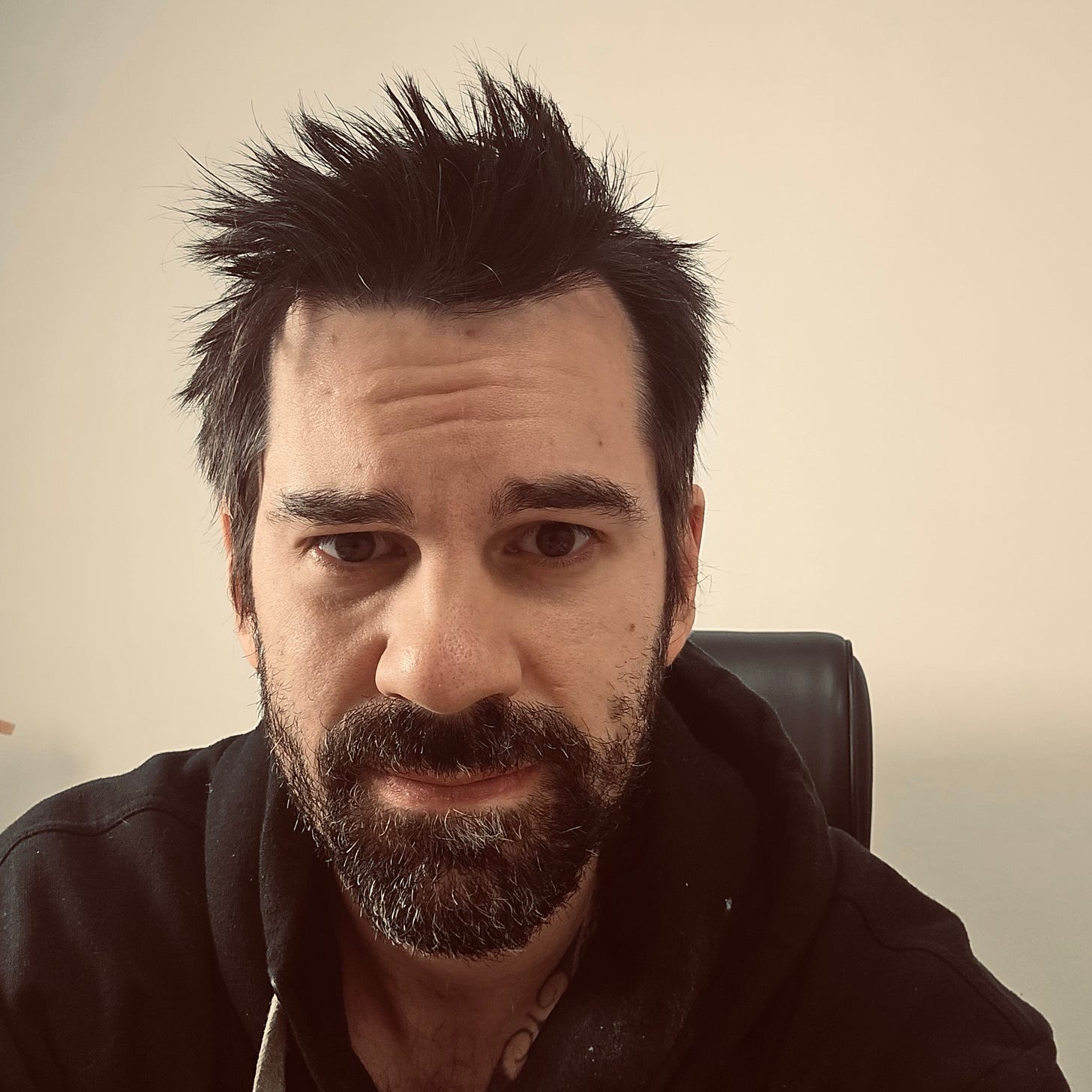Sikorav Against the World
A French psychiatrist’s efforts to do right by his patients brought him into conflict with the medical bureaucracy
I don’t write profiles for Psychiatry at the Margins but I’ve made an exception for Michael Sikorav given the peculiar situation in which he finds himself and my curiosity at the state of French psychiatry. Michael Sikorav MD is a psychiatrist in private practice in Changé, Mayenne in France. He is also a person living with bipolar disorder. He writes on his substack, Psychiatrie Internationale. His pharmacological practice is deeply informed by his own personal experiences with medications as well as his efforts to keep up with new evidence from clinical trials, two things that have brought him into conflict with the French healthcare system. As a psychiatric patient, he spent years cycling through standard treatment options such as lithium, lamotrigine, aripiprazole, often with little benefit or intolerable side effects. Quetiapine helped him tremendously in a state of mania/hypomania but left him profoundly sedated with a ravenous appetite. He ultimately used metformin to tackle the weight gain and hunger. He also found benefit from using levothyroxine to manage his depressive states.
Sikorav did his psychiatry residency from 2015 to 2019. He worked under contract at a psychiatric hospital from 2019 to 2022, facilitating a psychotherapy group. Once he began working independently in psychiatric private practice (2022), he offered to his patients what he believed was a higher standard of care: metformin to mitigate metabolic effects of psychiatric medications, thyroid augmentation in depression, and pramipexole in refractory depression. Such off-label use of medication isn’t particularly unusual in the United States (and I imagine in many other parts of the world), but in France it put Sikorav on a collision course with the system.
Pharmacists balked at his prescriptions. As Sikorav describes it, pharmacists tolerate poorly supported regimens such as high-dose loxapine and chlorpromazine in adults, antidepressant polypharmacy in bipolar disorder, and cyamemazine (Tercian, an old phenothiazine antipsychotic in France) for children, yet they would refuse to fill pramipexole for depression or metformin for medication-associated weight gain. The conflict wasn’t isolated to a particular pharmacy; a dozen different pharmacies pushed back, and the dispute escalated to formal complaints.
The pharmacy refusals created downstream problems. One bipolar patient was denied pramipexole at the counter. His psychiatric condition exacerbated and he made a serious suicide attempt. Once hospitalized, he finally received the medication. When Sikorav took the clinical evidence in support to the Medical Council, the board’s initial reaction was that his reasoning looked legitimate and they even proposed arranging a meeting to explain the medical evidence to health administrators and pharmacists. Both declined to attend.
Facing these obstacles, Sikorav went public in France. He told his story on social media, including the story of his own bipolar disorder, to destigmatize and to attract attention to the policy issues. That visibility triggered surveillance by the French National Health Insurance Fund, CPAM (the rough analogue of the Centers for Medicare & Medicaid Services). After monitoring his activity, they referred him to the Medical Council as dangerous and unstable, explicitly citing his bipolar disorder diagnosis and his frequent off-label prescribing—even though there were no complaints from his patients. Sikorav shares that his wife is also a psychiatrist in practice and had no concerns about his behavior during this period.
He then had to undergo two formal evaluations, one to scrutinize the clinical appropriateness of his prescribing, another to assess his psychiatric stability. A senior academic clinician who was familiar with the evidence behind off-label use intervened on his behalf. The second assessment felt demeaning, full of opaque psychoanalytic jargon that, in his telling, misrepresented what he’d said. In the end, he was cleared to continue practicing and prescribing. The process worked, as he put it, but the experience was bruising. All of this drama unfolded while he was working punishing hours and collecting and forwarding documents in his defense during nights at home, even as his newborn son was in intensive care after cardiac surgery. He felt this bordered on “harassment.”
The real predicament, however, was yet to come. In France, if you prescribe a medicine off-label, you are supposed to indicate that on the prescription, and then the patient pays for it out of pocket. When Sikorav inherited patients already on multiple off-label regimens or when he started patients on new off-label medications, he faced a difficult choice: mark everything as off-label and shift costs onto severely ill patients who often couldn’t manage payment or logistics, or continue writing clinically appropriate scripts without the “off-label” designation so they’d be reimbursed. He says he chose the latter to avoid destabilizing people. Administrators later treated that as a violation and began seeking clawbacks for those prescriptions. The medical board itself said his prescriptions were medically appropriate and supported by evidence from clinical trials. But administrative authorities kept pressing for repayment and dismissed the evidence he’d already sent. The risk he faces now is that the serious financial penalties would either functionally force him to quit the practice of psychiatry or leave the country and practice elsewhere.
There’s a harsher irony here in his view. The same system that reimburses widespread off-label antidepressant use in bipolar depression treats his off-label, literature-backed choices (metformin for antipsychotic-induced weight gain, pramipexole augmentation, thyroid hormone) as suspicious. He argues that French CME expectations are lax and that administrative medicine has accrued power without commensurate clinical literacy. He shares that he has strong satisfaction scores from his patients and he treats a large panel of people with severe mental illness who rely on him.
My impression of Sikorav is of a conscientious, sometimes blunt clinician who drew on his own experience and knowledge and used familiar off-label tools to keep very ill patients functional, and then found himself surveilled, evaluated, and financially threatened by the French healthcare bureaucracy. And this aggravation has continued despite being cleared to practice by the medical board, despite absent patient complaints, and despite providing essential psychiatric care to people in need.
Sikorav is aware of what psychiatry is actually like for many patients in France. When I asked about anti-psychiatry sentiment in France, he said that the loudest voices are usually the people who’ve been harmed. He told me that antidepressants are not the main scandal in France. In online debates, he watches people argue about SSRIs and antidepressant withdrawal, and he almost laughs bitterly. Complaints of antidepressant withdrawal are uncommon in his own practice. He says if overprescription of antidepressants was the biggest problem facing French psychiatric practice, that would actually be progress. The bigger problem, in his view, is the routine, almost casual use of neuroleptics or antipsychotics in situations where they’re not clearly indicated, or at doses and durations that are hard to defend. He’s seen far more iatrogenic damage from that than from SSRIs. He also finds it scandalous that massive weight gain and metabolic harm from psychiatric medications such as atypical antipsychotics is tolerated and normalized, with little to no effort to prevent or remedy it.
He sees a deep structural hypocrisy. On the one hand, public health authorities in France constantly talk about the importance of mental health. On the other hand, those same authorities called him “dangerous” because he was open about his bipolar disorder diagnosis, and they tried to use his diagnosis to undermine his legitimacy as a clinician. His troubles with CPAM arose in part due to his public visibility as a psychiatrist with experience of mental illness. On May 8, 2024, he had given a media interview in which he revealed his bipolar disorder diagnosis. A month later, the Medical Council informed him that the Health Insurance Fund sent them a report. After monitoring his social media activity, they concluded that he was in a decompensated state and continued practice of medicine was dangerous. Sikorav’s humor, e.g. his description of himself as an “apprentice sorcerer and potions master [wizard emoji]” along with some colleagues doing the same joke, was seen as bona fide evidence of psychiatric instability. Those claiming mental health as a national priority were using it to target clinicians.
He’s frank about coercion and inpatient psychiatry. He told me that given the current state of public psychiatric hospitals in France, he would do whatever he could to avoid being hospitalized. He’s never been hospitalized himself and he thinks the experience would break him. “It would be a disaster,” he said. He doesn’t roll his eyes at people who say psychiatry traumatized them. He thinks a lot of them are telling the truth.
I discussed Sikorav’s story with another French psychiatrist, my friend Christophe Gauld, an associate professor of child psychiatry at Hospices Civils de Lyon (Lyon, France). The refusals to dispense off-label prescriptions do not surprise him. Describing French regulations as rather strict and “dusty,” he said that he can easily imagine the resistance Sikorav faced. Coverage for off-label use is a recurring issue in France for all areas of medicine. Gauld says that he himself faces the question of off-label prescriptions on a daily basis, however, he finds the matter “ethically complicated.” He explains, “it amounts to contesting a principle of social justice that, in the end, supports the functioning of our healthcare system. In France, we already have the privilege of a fully free healthcare system; can we really, ethically, expect that patients never pay anything?” And indeed, even in the US, the problem resurfaces in a different manner. US physicians do not face the same dilemma as French physicians because the locus of power is elsewhere in the system: healthcare insurance companies. Off-label use of cheap, generic medications is generally not a problem for those who are insured, but insurance companies do pose obstacles for certain medications or medication formulations in a rather arbitrary and inconsistent manner via prior authorization requests. Off-label use (and sometimes even on-label use) of expensive medications remains fairly restricted. Gauld notes that off-label uses of psychiatric medications that are currently authorized in France (such as melatonin for children) are the outcome of collegial discussions and shared understanding of clinical benefit among different professionals, even if it isn’t formalized in any regulation.
Sikorav is uncertain about what comes next. Rapid institutional reform feels unlikely, though he still harbors a modest hope that something shifts enough for him to keep working. He refuses to accept a sclerotic prescribing culture that underserves patients. If the pressure becomes untenable, he has considered leaving France. He’d much rather stay, and see France catch up to modern psychiatric practice.
Acknowledgements: The above profile is based on a detailed video interview I conducted with Michael Sikorav on Oct 20, 2025. As evidence, Sikorav shared with me the relevant document he had received from the Medical Council. I also sought input on the situation from another French psychiatrist, Christophe Gauld. Elements of the story have also been reported in some French newspapers and magazines; I consulted and verified details from an article in Le Canard enchaîné, Le psy que la Sécu rend dingue (March 13, 2025).
See also:






Thank you for sharing my story Awais !
I've checked again and there is still zero prospective studies on cyamemazine, the most commonly prescriped neuroleptic here, allowed in liquid form at age 3.
What a mess
Hello, thank you for this article that highlights the deterioration of health and mentality in France. I am a psychiatrist, 56 years old, and I practiced in Paris and the surrounding region, first in a university hospital and then in private practice until 2019. Throughout my career, I have always prescribed LT3, which has been referred to for many years as an adjunct treatment for antidepressants in resistant depression (though without scientifically proven effectiveness, nor personal observation). I have also prescribed pramipexole (unfortunately not very effective and generating quite a few side effects when the dose is increased), lamotrigine - one of the best-tolerated and very effective mood stabilizers, whether used alone or in combination with lithium to enhance antidepressant effects, and oxcarbazepine (as a mood stabilizer), among others. Currently, I prescribe SEMAGLUTIDE to my patients with severe obesity without diabetes, with reimbursement, and monitoring of liver elastography shows improvement after one year of treatment. Therefore, the fact that this colleague has faced so many problems shocks me and indicates a regression in the mentality of healthcare professionals and the health insurance system.